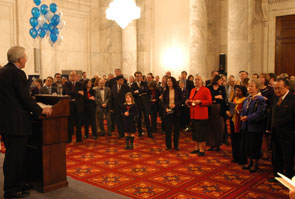Twenty Years of Progress in Peacemaking: A Salute to Congress

Image above: USIP president Richard H. Solomon addresses guests at the 20th Anniversary reception.
Overview
The Institute celebrated the 20th Anniversary of its founding with a special reception on Capitol Hill on March 16, 2005 that saluted current and former Members of Congress for their roles in creating and supporting the Institute for two decades. In his remarks to the more than 250 guests at the reception, Institute president Richard H. Solomon reaffirmed the Institute's commitment to fulfilling its Congressional mandate to "search for non-violent approaches to dealing with international conflict."
Acknowledgments
The United States Institute of Peace was established and has grown on the basis of long-term public interest and dedicated support from many Members of Congress. The Congressional founders of the Institute brought tremendous creative energy to creating an institution dedicated to international conflict resolution. We gratefully acknowledge and honor the men and women who helped found the Institute, including Representative Dante Fascell of Florida, Representative Dan Glickman of Kansas, Senator Mark Hatfield of Oregon, Senator Nancy Kassebaum of Kansas, Senator Claiborne Pell of Rhode Island, Representative John Porter of Illinois, Senator Paul Simon of Illinois, Representative Pat Williams of Montana, as well as Members of Congress today.
Specifically, the Institute recalls the pioneering efforts of Senator Spark Matsunaga of Hawaii and Senator Jennings Randolph of West Virginia.
We also want to express our thanks to Senator Daniel Akaka (D-Hawaii), Senator Chuck Hagel (R-Nebraska), and Congressman Donald Payne (D-New Jersey) for joining us at the reception.
Program and Archived Video
To listen to audio or to view video, please click on the links provided below. You also can right click on the links and choose "Save Target As" or "Download Linked File." This will save the file to your computer and then allow you to play it in your media player directly.
Welcoming Remarks
- Richard H. Solomon, President, U.S. Institute of Peace
Congressional Perspective
- Senator Daniel Inouye (D-Hawaii)
- Senator Ted Stevens (R-Alaska)
- Senator Tom Harkin (D-Iowa)
- Senator Richard Lugar (R-Indiana)
- House Minority Leader Nancy Pelosi (D-California)
- Congressman Ed Case (D-Hawaii)
Other Friends
Historical Perspective
- The Honorable Dan Glickman
President and CEO, Motion Picture Association of America
(Member of Congress, D-Kansas, 1977-1995)
Salute to Congress
- J. Robinson West, Chairman of the Board, U.S. Institute of Peace
- Maria Otero, Vice Chairman of the Board, U.S. Institute of Peace
- Chester Crocker, Former Chairman of the Board (1992-2004), U.S. Institute of Peace




